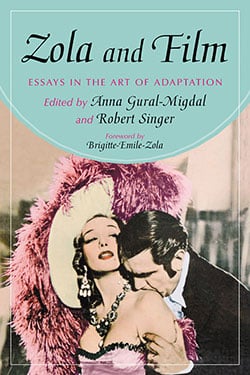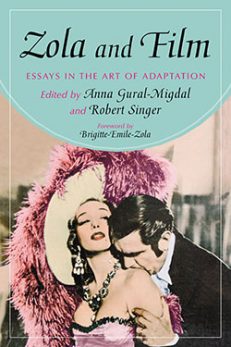Zola and Film
Essays in the Art of Adaptation
$39.95
In stock
About the Book
French novelist Émile Zola, noted for his championship of the Naturalist novel, has been one of the most adapted authors in world literature. There have been approximately 80 film adaptations of his late 19th century novels and short stories, many of which occurred during the silent era of international film production (1895–1927). While the aesthetic elements of Zola’s fiction continue to appeal to international cinema, the author’s thematic naturalism and his “scientific methodology” have provided an ideological framework that incorporates art, science and history into the many cinematic adaptations of his work.
This collection of essays, contributed by scholars of French literature and film, explores the dynamic relationship between Zola’s fiction and its film adaptations, examining critically significant cinematic adaptations of Zola’s novels from a variety of theoretical and interdisciplinary perspectives. The 13 essays discuss the adaptation of Zola’s works within the limitations of the silent cinema; the challenges posed by film censorship and the notoriety of the author’s naturalist text; the ideological inflection given to Zola’s working class narratives; and Zola’s representation of women. Zola’s works are placed within their respective historical contexts, as the essays address encoded anti–Nazi sentiment in films produced under the German occupation of France during World War II and the French Communist Party’s reception of the filmic adaptation of Germinal. Other adapted works addressed in these chapters include La Terre, Nana, La Bête humaine, Au Bonheur des Dames, Thérèse Raquin, Gervaise and Pot-Bouille.
About the Author(s)
Bibliographic Details
Edited by Anna Gural-Migdal and Robert Singer
Foreword by Brigitte Émile-Zola
Format: softcover (6 x 9)
Pages: 229
Bibliographic Info: photos, filmography, index
Copyright Date: 2005
pISBN: 978-0-7864-2115-2
Imprint: McFarland
Table of Contents
Acknowledgments v
Foreword Brigitte Émile-Zola 1
Introduction Robert Singer 5
1. Antoine’s Version of La Terre: An Experiment in Naturalist Cinema Russell Cousins 15
2. Eisenstein and Zola: Naturalism, Cinema, and Mythography Tony Williams 27
3. Staging the Courtesan: Taking Zola’s Nana to the Movies Heather Howard 45
4. From Theater to Cinema: Jean Renoir’s Adaptation of Nana Katherine Golsan 62
5. The Eye Behind the Writing Hand: Surveillance and Adaptation in La Bête humaine Monica Filimon 69
6. “La Rançon du progrès”: Naturalistic Discourse and Two Adaptations of Zola’s Au Bonheur des Dames Klaus Peter Walter 89
7. Viewing Au Bonheur des Dames in the Context of Occupied France Jennifer Wolter 103
8. Thérèse Raquin in a Fog-Covered Corner Alicja Helman 117
9. Ideology and Focalization in Gervaise: The Aurenchébost/René Clément Treatment Russell Cousins 132
10. The Female Reader in Pot-Bouille and Duvivier’s Cinematic Representation Elisabeth-Christine Muelsch 148
11. The Fabrication of Claude Berri’s Germinal Anna Gural-Migdal 163
12. Nostalgia Is Hard to Let Go: The French Communist Party’s Reception of Claude Berri’s Filmic Adaptation of Germinal Laurent Marie 182
13. “At the Still Point”: Framing the Naturalist Moment Robert Singer 194
Select Filmography 207
About the Contributors 211
Index 215





